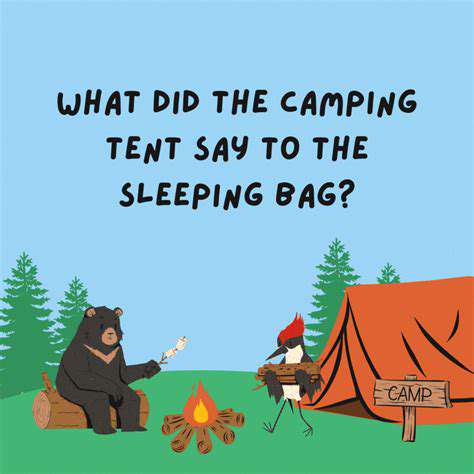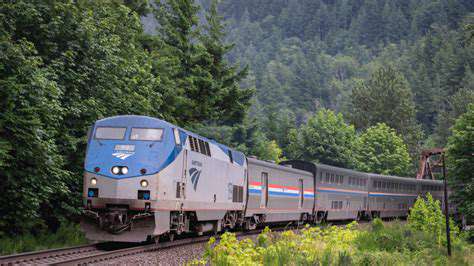Planning a Family Camping Trip [Beginner's Guide]
Choosing the Right Camping Destination

Finding the Perfect Campground
Selecting the ideal campground is crucial for a successful camping trip. Consider factors like the available amenities, the proximity to attractions, and the overall atmosphere of the campsite. Campgrounds offering potable water, restrooms, and picnic tables can significantly enhance your experience. Researching different campgrounds in advance allows you to compare features and prices, ensuring a smooth and enjoyable stay.
Don't underestimate the importance of checking campground reviews from previous visitors. This valuable feedback can provide insights into the campground's cleanliness, service quality, and overall experience. This can help you avoid any unpleasant surprises and make an informed decision about where to pitch your tent or set up your RV.
Climate and Weather Considerations
The weather plays a pivotal role in planning your camping adventure. Understanding the typical weather patterns for your chosen destination is essential. Consider the expected temperature range, precipitation possibilities, and potential for extreme weather events, such as storms or heat waves. These factors influence your packing list and your overall comfort during the trip.
Accurately assessing the weather forecast allows you to pack appropriate clothing and gear. This preparation can be critical for a safe and enjoyable outdoor experience. Consider bringing rain gear, warm layers, or sunscreen depending on the forecast.
Accessibility and Terrain
Evaluate the accessibility of the campsite and the surrounding terrain. Some campgrounds might have steep hills, uneven ground, or challenging access points for vehicles, affecting your mobility and ease of setup. Careful assessment of the terrain and trail systems will allow you to accurately assess the level of difficulty associated with your chosen camping location. Consider the physical limitations of yourself and other campers when making your choice.
Are there designated hiking trails or nature walks nearby? If so, understanding the difficulty levels and the overall terrain of these paths is important for planning. Checking trail maps and local guides before you go will help you plan your hikes and outdoor activities.
Activities and Attractions
Consider the nearby attractions and activities that pique your interest. Are there hiking trails, swimming holes, scenic overlooks, or other attractions nearby? Researching local activities before you go helps you tailor your itinerary and make the most of your time. Planning activities in advance will also allow you to allocate sufficient time to enjoy each attraction and participate in the local offerings.
Consider if there are any local events or festivals that coincide with your camping trip. This can significantly enhance your experience by exposing you to local culture and traditions.
Budget and Cost Considerations
Camping destinations vary significantly in their price points. Research the costs associated with different campsites, including campsites fees, and potential additional expenses, such as entrance fees to parks or attractions. Compare prices across different campgrounds and weigh the value of amenities against the cost. This careful consideration ensures that your camping experience stays within your budget.
Travel Time and Logistics
Factor in travel time and logistics. How far is the campground from your home? What are the transportation options available, and how long will it take to get there? Assessing the travel time is critical, especially if your camping trip involves a long drive or involves traveling by public transport. Consider any potential traffic delays and plan accordingly.
Be sure to check for specific park rules or restrictions on vehicles or parking near the campground. This will save you time and ensure a smooth experience getting to and from your campsite.
Campsite Amenities and Services
Evaluate the amenities offered at the campground. Does it have restrooms, potable water, laundry facilities, or other services? Assessing the quality of the amenities will significantly impact your overall camping experience. Consider if you'll need to bring additional supplies like water bottles or a portable stove depending on what is provided.
Creating a Detailed Camping Itinerary
Planning Your Pre-Trip Essentials
Before embarking on your family camping adventure, meticulous planning is key to a smooth and enjoyable experience. This includes researching potential campsites, considering your family's needs and preferences, and ensuring you have all the necessary gear. Thoroughly checking weather forecasts, especially if your trip spans multiple days, is crucial to packing appropriate clothing and gear. This preparation will prevent unexpected issues and enhance the overall camping experience.
Booking your campsite well in advance is also vital, especially during peak season. This will guarantee your preferred location and avoid disappointment. Don't forget to consider potential transportation needs and plan routes for getting to and from the campsite.
Choosing the Right Camping Location
Selecting the ideal campsite is a significant factor in your family's camping trip. Consider the age and interests of your children when choosing a location, balancing accessibility with the opportunity for exploration. Research different campsites within your desired location to ensure that the facilities and amenities align with your family's needs. Factors like nearby hiking trails, water access, and kid-friendly activities should be top considerations.
Packing Smart for Comfort and Safety
Packing smart is essential for any camping trip, and even more so for a family adventure. Create a comprehensive packing list, considering the weather conditions expected and any specific needs of your family members. Include plenty of comfortable clothing suitable for both daytime activities and nighttime rest, along with appropriate footwear. Don't forget essential items like first-aid supplies, sunscreen, insect repellent, and a portable water purification system.
Crafting a Kid-Friendly Itinerary
Incorporating age-appropriate activities will ensure your children enjoy the camping experience. Plan a schedule with a mix of structured and free-form activities. Include playtime time outdoors, guided nature walks, storytelling sessions, and engaging games that cater to the interests of your children. Consider visiting nearby nature centers or wildlife preserves if they have age-appropriate programs.
Planning for Meals and Food Storage
Food preparation and storage are important aspects of a successful camping trip. Prepare a meal plan that considers the preferences of all family members. Choose recipes that are easy to prepare in a camping environment and consider utilizing cooking methods suitable for a campfire or portable stove. Remember food safety measures, correctly storing food and ensuring proper waste disposal.
Managing Activities and Downtime
Balancing activities and downtime is key for a positive camping experience for all ages. Plan a variety of activities that cater to different interests and energy levels. Be sure to include downtime for rest and relaxation, allowing everyone to unwind and enjoy the natural beauty of the surrounding environment. Building in flexibility into your schedule is essential to account for unexpected changes in weather or personal preferences.
Ensuring a Safe and Enjoyable Trip
Prioritize safety on your family camping trip. This includes checking for potential hazards like uneven terrain or wildlife and ensuring all family members are aware of safety protocols. Ensure proper supervision of children, especially around water sources. Have a designated meeting point in case anyone gets separated and inform relevant parties of your itinerary. A comprehensive safety plan will contribute greatly to a more secure and enjoyable camping trip.



